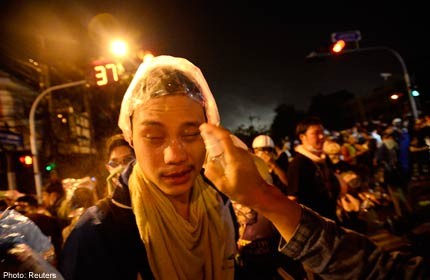Inside Bangkok protest hot spots: More tears

Artificially-induced tears flowed freely at protest sites in Bangkok on Monday.
Police used tear gas as violence continued around key institutions - Government House, Parliament and the Metropolitan Police Headquarters in the historic quarter of the Thai capital.
The area has some of Bangkok's main tourist attractions such as the Grand Palace, Wat Pho temple, the Bangkok zoo and the backpacker area of Khao San Road, reported AP.
Stone-throwing protesters battled through clouds of tear gas in renewed assaults. Many of them wore raincoats and plastic bags over their heads as protection against the sting of tear gas.
The United Nations closed its office, dozens of schools were shut and some civil servants skipped work. But most of Bangkok, a city of 10 million, has been unaffected, with malls reopening after closing on Sunday.
Police stepped up their response after using round upon round of tear gas.
"We are alternating between the use of water cannons, tear gas and rubber bullets. Rubber bullets are being used in one area only, and that is the bridge near Government House," Mr Paradorn Pattanathabutr, the head of the National Security Council, told Reuters.
While the protesters' numbers have fallen since an estimated 180,000 people took part in an opposition rally on Nov 24, they have besieged high-profile targets - including ministries - in what some observers believe is an attempt to provoke a military coup.
But the army has tried not to get involved, only reluctantly providing unarmed back-up for police.
"The military has positioned itself as neutral and it wants to see a peaceful way out," Thai Prime Minister Yingluck Shinawatra said yesterday.
She rejected protesters' demands to suspend the country's democratic system and indicated she would not resign.
"Anything I can do to make people happy, I am willing to do... but as prime minister, what I can do must be under the constitution," she said, adding that she did not "cling to power".

Get The New Paper for more stories.